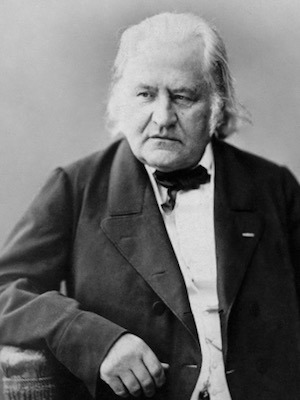Auguste-Nicolas Gendrin
Biography
- Born 6 December 1796 Chateaudun (Eure-et-Loir), France
- 1823 – Le prix de la Société de médecine de Paris
- 1824 – Le prix de la Société médicale d’émulation
- 1832 – Le prix de l’Académie des sciences with a monograph on cholera
- Died 5 January 1890 in Paris, France
Medical Eponyms
Pierre Félix Merklen (1852 – 1906) described la position genu-pectorale as a sign of pericarditis and acknowledged Gendrin with his early description.
Gendrin had already insisted on this extreme dyspnea which, in pericardial distension, makes patients unable to sleep other than sitting on their beds and leaning forward.
Merklen 1892
Gendrin in turn acknowledged early descriptions by Leopold Auenbrugger (1722 – 1809); Giovanni Maria Lancisi (1654 – 1720); and Pierre Barrère (1690 – 1755)
Parmi les signes mentionnés par Auenbrugger, la dyspnée est un de ceux auxquels il paraît attacher le plus d’importance. Ce n’est, en effet, qu’un symptôme d’extrême dyspnée que l’impossibilité pour le malade de ne pouvoir dormir qu’assis sur le lit et incliné en avant, et que le sommeil soit à chaque instant interrompu par la chute du corps entraîné par le poids de la tête. Nous avons souvent observé ce symptôme; il a été implicitement indiqué par Lancisi et de la manière la plus formelle par Barrère; il est constant quand l’épanchement inflammatoire est porté au point de distendre le péricarde; hors ce cas, nous ne l’avons jamais observé; mais nous avons remarqué dans la plupart des péricardites, lors même que le péricarde n’est pas encore distendu par l’épanchement à un haut degré, que les malades ne reposent et ne respirent avec moins de difficulté que le corps un peu élevé et dans une attitude demi-assis dans le lit, le tronc légèrement fléchi et incliné à gauche.
Gendrin 1841
Among the signs mentioned by Auenbrugger, dyspnea is one of those to which he seems to attach the most importance. It is, in fact, only a symptom of extreme dyspnea that the impossibility for the patient to be able to sleep only sitting on the bed and tilted forward, and that sleep is interrupted at all times by the fall of the body driven by the weight of the head. We have often observed this symptom; it has been implicitly indicated by Lancisi and in the most formal manner by Barrère it is constant when the inflammatory effusion is worn to the point of distending the pericardium; apart from this case, we have never observed it; but we have noticed in most pericarditis, even when the pericardium is not yet distended by effusion to a high degree, that the patients rest and breathe with less difficulty than the slightly elevated body and in a half-seated attitude in bed, the trunk slightly bent and tilted to the left.
Gendrin 1841
Key Medical Attributions
Controversies
Major Publications
- Gendrin AN. Histoire anatomique des inflammations Tome I. 1822 (Tome II)
- Gendrin AN. Considérations générales sur l’enseignement et l’étude de la médecine au lit des malades. 1831
- Gendrin AN. Monographie du choléra-morbus épidémique de Paris. 1832
- Gendrin AN. Traité philosophique de médecine pratique Tome I. 1838 (Tome II)
- Gendrin AN. Mémoire sur le diagnostic des anevrysmes des grosses artères. 1840
- Gendrin AN. Leçons sur les maladies du coeur et des grosses artères,. Faites a l’hopital de La Pitié pendant les années 1840-1841
References
- Necrologie: Auguste-Nicolas Gendrin (1796-1890). Progrès médical. 1890; XI: 36-37
- Bouquet H. Le monde médical Parisien il y a 100 ans, les procès médicaux. Progrès médical. 1942; 399-408
- Auguste-Nicolas Gendrin (1796-1890). data BNF
- Gendrin, Augustin Nicolas. BIU Santé — Médecine

eponym
the person behind the name

